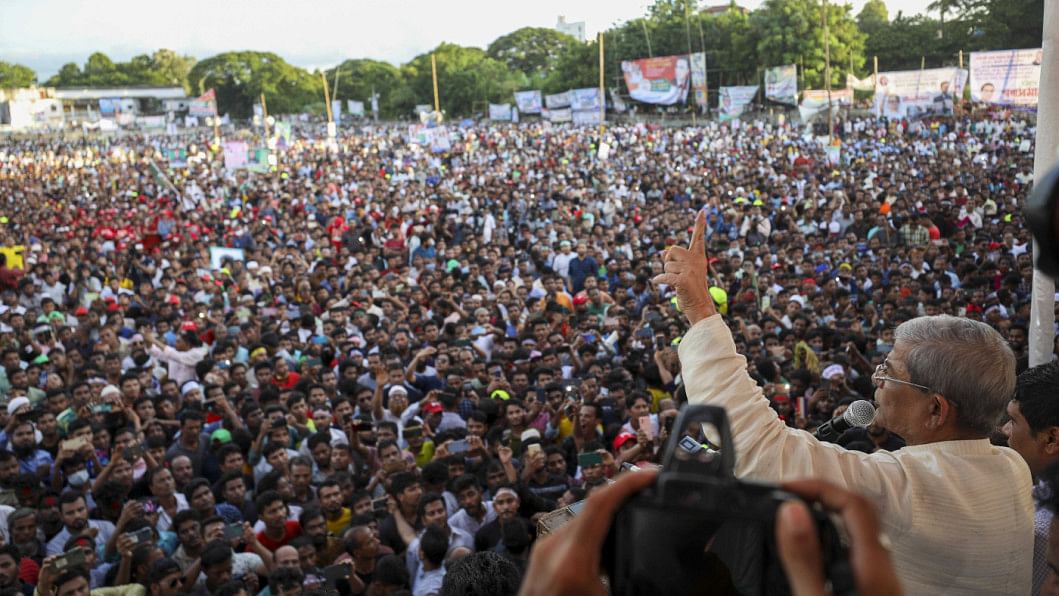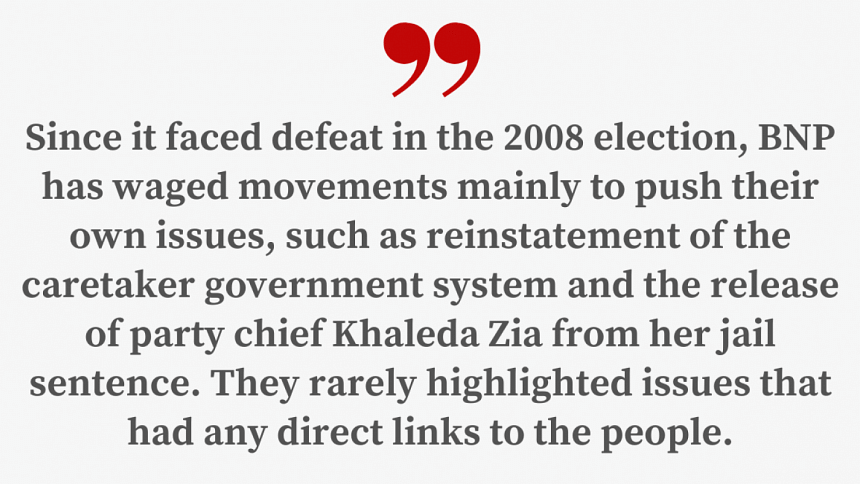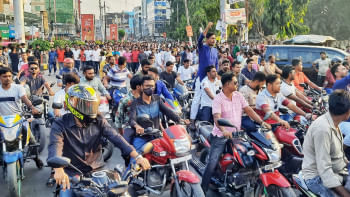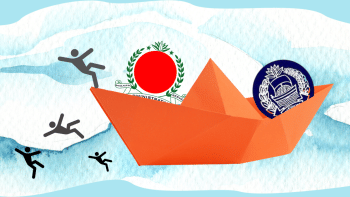Is BNP emerging as a worthy opposition?

Enforcing transport strikes to foil a mass event organised by the political opposition is an old strategy. When the BNP started holding protest rallies in the country, they faced the same hurdle. But this old trick seems to have failed or at least been ineffective in Mymensingh and Khulna, where the BNP held rallies recently. Despite the transport strikes backed by the ruling party in these two districts, tens of thousands of supporters and party members attended from adjacent districts. There were fears of arrest and harassment or attacks from Awami League supporters, and in some places, that fear rang true. Yet, BNP supporters came.
What made them defy the odds? What does the BNP want to achieve through such mass mobilisation? What message do they want to give to the Awami League? Answers to these questions are crucial to understanding the future course of Bangladesh politics.
Since it faced defeat in the 2008 election, BNP has waged movements mainly to push their own issues, such as reinstatement of the caretaker government system and the release of party chief Khaleda Zia from her jail sentence. They rarely highlighted issues that had any direct links to the people. Moreover, the party was blamed for the arson attacks that claimed many lives during their street demonstrations launched before the 2014 election. Those demonstrations drew massive criticism, from both inside and outside the country.
In fact, their failure to address issues that affect people's lives is often seen as one of the serious strategic mistakes the party made in the past. This time, however, the party took to the streets to voice grievances almost exclusively on issues such as price hikes and corruption. Through protests, the party is trying to correct their failure in not portraying themselves as a pro-people entity.
Judging by these turns of events, it seems, even if in appearance, that BNP has been able to emotionally drive its supporters to join street protests. Previously, whenever they launched a movement, there was a common belief that central leaders would be resting in their drawing rooms while the party followers came out on the streets. This time, however, BNP's central leaders were out on the street to lead the protests, and it paid off through massive gatherings.

Most importantly, BNP has been out of power for nearly one and a half decades, which is rare for the party. Their leaders and activists – more specifically, all the post-holders, including party chief Khaleda Zia – have been facing a number of cases and arrest warrants. The party has been alleging that around 600 political leaders and activists, members of civil society and labour leaders are victims of enforced disappearances in Bangladesh. They claim their backs are against the wall and they have no option but to wage a movement. At BNP's first divisional rally in Chattogram, Secretary-General Mirza Fakhrul Islam Alamgir said, "It's a big and tough struggle for us, and we must win it. We have no alternative but to win this battle. We will either win or die."
The other reason is the eternal anti-incumbency in the country that every political party that has ever been in power has had to deal with. Since democracy was restored in 1991, none of the political parties were able to stay in power for consecutive terms (until 2009). However, the ruling party has in office for the third consecutive term, and anti-AL sentiments have been raging through much of the population for the past years.
By organising such rallies and staging protests, BNP wants to send a few messages to the ruling Awami League. First, the party is more organised now than ever, no matter what state the party leadership is in, with Chairperson Khaleda Zia convicted on corruption charges and Acting Chairman Tarique Rahman in exile in London. Second, there is a perception that the party cannot do anything by themselves, but with these programmes, they have shown they are indeed capable of holding rallies and protests on their own, without the help of their allies. The organisational strength of the party, which many believed had diminished over the years, was displayed by the presence of tens of thousands of party men in the rallies. Supporter turnout is merely an indicator of the party's popularity, which is just one of many prerequisites for winning an election.
In the last 14 years, BNP has tried two of the three known ways of putting pressure on their political rivals: waging violent street protests in 2014 and 2015, and peaceful tactical negotiations in 2018. None of those worked. This time around, the party seems to have learnt from past mistakes and adopted the difficult yet definitive third path – engaging with the general public by highlighting pro-people issues, strategically reviving its grassroots workers, slowly building up a peaceful movement through mass rallies, and most importantly, making sure that its top leaders are out there leading from the front and directly connecting with the people. Again, this might be the most difficult and lengthy way of running a political movement, but it also gives the party a greater chance of remaining relevant to the people, and hence creating a serious headache for the ruling party.
Mohammad Al-Masum Molla is deputy chief reporter at The Daily Star.

 For all latest news, follow The Daily Star's Google News channel.
For all latest news, follow The Daily Star's Google News channel. 







Comments